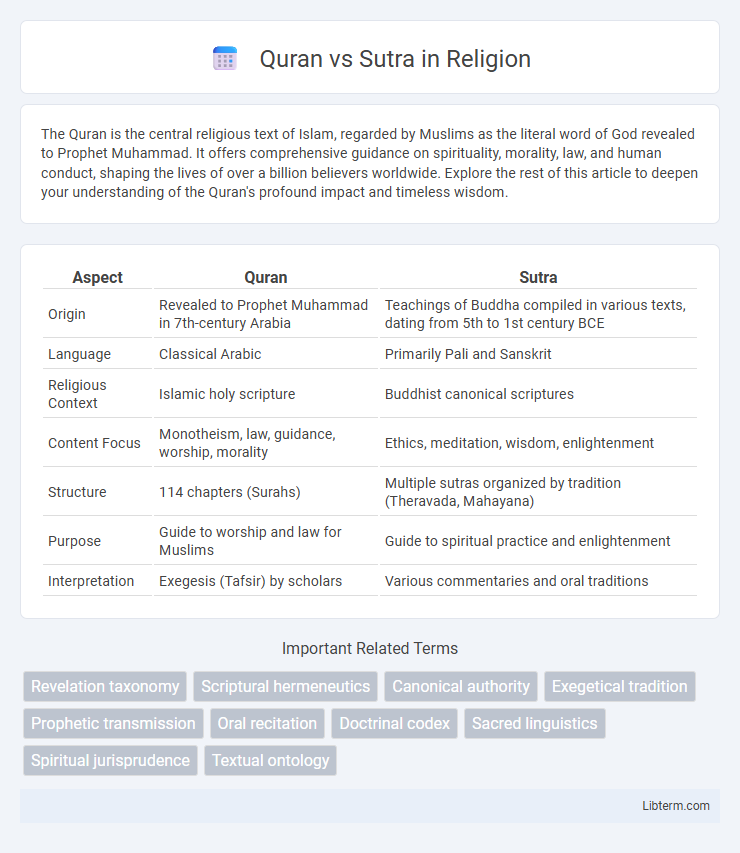The Quran is the central religious text of Islam, regarded by Muslims as the literal word of God revealed to Prophet Muhammad. It offers comprehensive guidance on spirituality, morality, law, and human conduct, shaping the lives of over a billion believers worldwide. Explore the rest of this article to deepen your understanding of the Quran's profound impact and timeless wisdom.
Table of Comparison
| Aspect | Quran | Sutra |
|---|---|---|
| Origin | Revealed to Prophet Muhammad in 7th-century Arabia | Teachings of Buddha compiled in various texts, dating from 5th to 1st century BCE |
| Language | Classical Arabic | Primarily Pali and Sanskrit |
| Religious Context | Islamic holy scripture | Buddhist canonical scriptures |
| Content Focus | Monotheism, law, guidance, worship, morality | Ethics, meditation, wisdom, enlightenment |
| Structure | 114 chapters (Surahs) | Multiple sutras organized by tradition (Theravada, Mahayana) |
| Purpose | Guide to worship and law for Muslims | Guide to spiritual practice and enlightenment |
| Interpretation | Exegesis (Tafsir) by scholars | Various commentaries and oral traditions |
Introduction: Defining the Quran and Sutra
The Quran is the central religious text of Islam, believed to be the literal word of God as revealed to Prophet Muhammad, containing 114 chapters called surahs. Sutras are ancient scriptures in Hinduism, Buddhism, and Jainism, comprising teachings, rules, and aphorisms that guide spiritual practice and philosophy. While the Quran is regarded as a unified divine revelation, Sutras represent a diverse collection of doctrinal texts tailored to different sects and traditions.
Historical Origins and Background
The Quran, revealed to Prophet Muhammad in 7th-century Arabia, serves as the central religious text of Islam, believed to be the literal word of God as conveyed through angel Gabriel. In contrast, the Sutras, foundational scriptures in Hinduism and Buddhism, originated over a broad period between the 6th century BCE and 4th century CE, encompassing diverse teachings, rules, and philosophies compiled by various sages and religious leaders. While the Quran emphasizes monotheism and divine revelation, the Sutras often focus on ethical guidelines, meditation practices, and metaphysical insights, reflecting their distinct historical and cultural contexts.
Core Beliefs and Central Themes
The Quran emphasizes monotheism, prophethood, and the afterlife, serving as the divine revelation for Muslims centered on submission to Allah's will. Sutras, foundational to Buddhism and Hinduism, focus on teachings related to enlightenment, karma, and the cycle of rebirth, guiding followers toward spiritual liberation. Both texts address moral conduct and the path to ultimate truth but diverge in theological frameworks and metaphysical concepts.
Language and Literary Structure
The Quran is composed in Classical Arabic, featuring a unique rhythmic and rhymed prose known as saj', which enhances memorability and oral recitation, while the Sutras are primarily written in Sanskrit or Pali, utilizing metrical verses designed for chanting in Buddhist rituals. The literary structure of the Quran consists of 114 chapters (surahs) varying in length and thematic focus, whereas Sutras are organized as discourses or sermons attributed to the Buddha, often in a more prose-like format with doctrinal teachings. The linguistic precision and inimitability of the Quran's language emphasize its divine origin, contrasting with the Sutras' emphasis on doctrinal explanation and practical guidance through poetic and mnemonic devices.
Modes of Revelation and Compilation
The Quran, believed to be revealed to Prophet Muhammad through Angel Gabriel over 23 years, was orally transmitted and later compiled into a single codex under Caliph Uthman to preserve its authenticity. Sutras, primarily associated with Buddhist traditions, were often memorized and orally passed down by disciples before being committed to manuscript form centuries later, leading to multiple versions and interpretations. The Quran's standardized compilation contrasts with the Sutras' fluid transmission, reflecting differences in preservation, textual authority, and modes of revelation.
The Role in Worship and Daily Life
The Quran serves as the primary source of guidance for Muslims, shaping daily prayers, rituals, and ethical conduct through its verses and commandments. Sutras, as foundational texts in Buddhism and Hinduism, offer teachings and meditative practices that influence worship, moral behavior, and mindfulness in everyday life. Both texts deeply embed spiritual principles into routine actions, reinforcing faith and discipline within their respective religious communities.
Interpretations and Commentaries
The Quran's interpretations and commentaries, known as Tafsir, provide detailed explanations of its verses, exploring linguistic roots, historical contexts, and theological implications. Sutras, particularly in Hinduism and Buddhism, are accompanied by extensive commentaries called Bhashyas or Shlokas, which elucidate philosophical meanings and practical applications within their respective traditions. Both texts rely on centuries of scholarly exegesis to guide adherents in understanding complex spiritual concepts and laws.
Influence on Culture and Society
The Quran has profoundly shaped Islamic culture, influencing legal systems, art, literature, and daily practices across Muslim-majority societies for over 1,400 years. The Sutras, foundational texts in Buddhism and Hinduism, have deeply impacted spiritual traditions, meditation practices, and ethical frameworks throughout South and East Asia. Both texts continue to guide millions by embedding religious values into social norms, education, and cultural identity globally.
Key Differences and Similarities
The Quran, the Islamic holy scripture revealed to Prophet Muhammad, emphasizes monotheism, moral guidance, and legal principles, while the Sutra, particularly in Buddhism, consists of discourses attributed to Buddha focusing on the path to enlightenment and ethical living. Both texts serve as foundational spiritual guides, promoting compassion, discipline, and the pursuit of truth within their respective traditions. The Quran is structured as a single unified book in classical Arabic, whereas Sutras comprise multiple texts often written in Pali or Sanskrit, reflecting doctrinal diversity across Buddhist schools.
Conclusion: Comparative Reflections
The Quran and the Sutras represent foundational texts in Islam and Hinduism, respectively, each offering unique theological insights and ethical frameworks. While the Quran emphasizes monotheism and divine revelation through a single prophet, the Sutras provide diverse philosophical teachings and practices aimed at spiritual liberation. Both scriptures continue to influence millions, shaping distinct cultural, moral, and spiritual landscapes worldwide.
Quran Infographic

 libterm.com
libterm.com